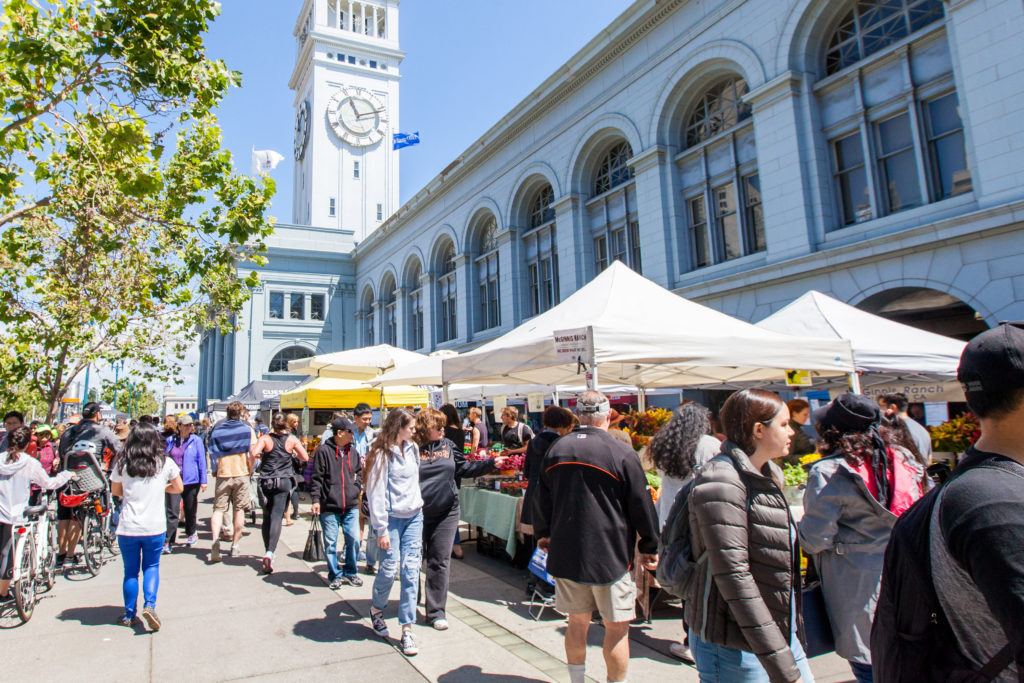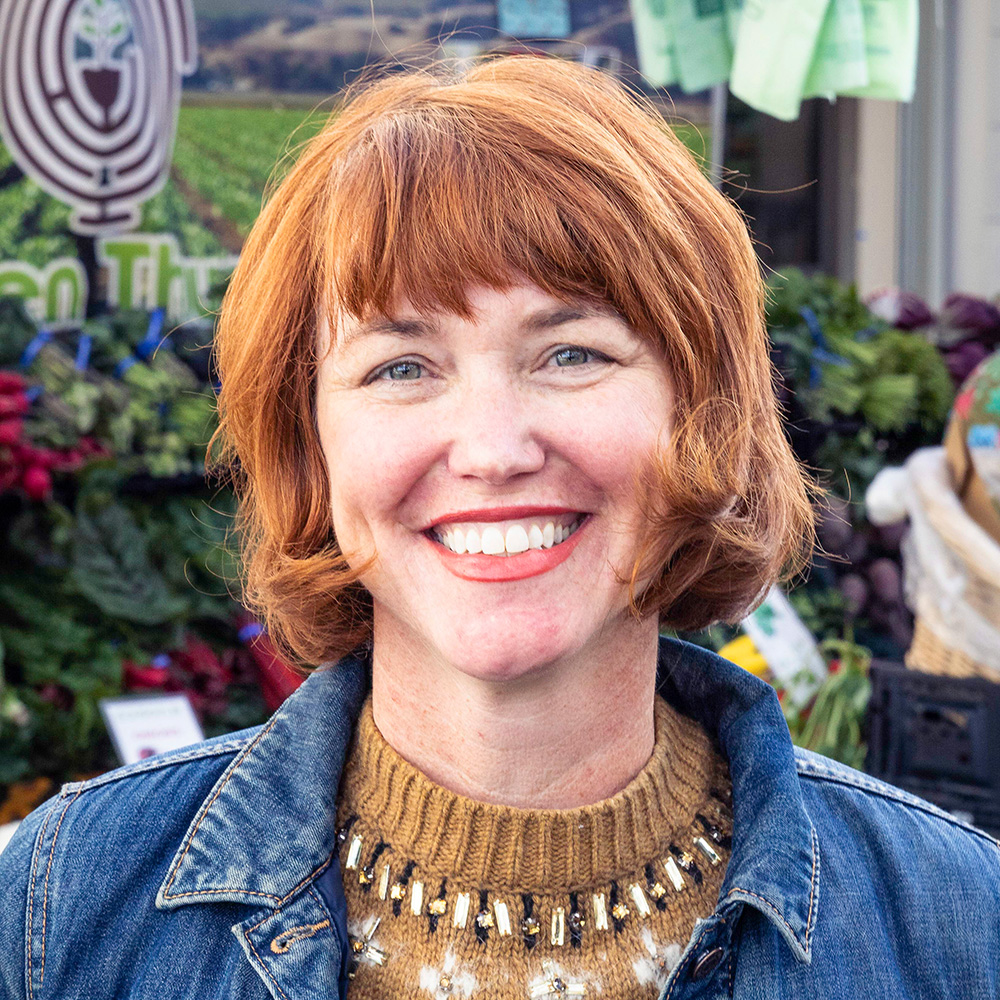Foodwise: Reflecting on 30 Years of Farmers Markets, Education, and Community
Christine Farren, Executive Director
May 26, 2023

With Foodwise (originally CUESA) celebrating 30 years of the Ferry Plaza Farmers Market this spring, I’ve been ruminating on what got us to this milestone year, and where we are headed next. It’s also my own anniversary of working for this organization for 20 years, so it’s been a time for reflection.
The Ferry Plaza Farmers Market was born on May 22, 1993, several years after the Loma Prieta Earthquake shook San Francisco to its core. But out of the rubble, seeds grew as neighbors, chefs, and local farmers came together to reclaim the waterfront and the Ferry Building for the public commons, as a showcase for California’s best and freshest sustainably grown food.
At the time, there were only two other farmers markets in the city. Starting a farmers market was not only a way to revitalize our city and the waterfront: it was a grassroots response to the increasing corporate consolidation and environmental degradation of the industrial food system. It was also very much a practical action of bringing fresh, nutritious produce to folks who live and work in SF. At the core of it all was a deep commitment to education and community.
Convening Kids, Chefs, and Community
Our origin story is important because it really does set the foundation for Foodwise’s work today. The nonprofit Center for Urban Education about Sustainable Agriculture (CUESA), which would later become Foodwise, was formed shortly after the farmers market took root.
Founder Sibella Kraus and other visionaries like pioneering grocer Bill Fujimoto, chefs Alice Waters and Patricia Unterman, farmer Judith Redmond, and urban planner Tom Sargent knew back in 1994 that running farmers markets alone wouldn’t accelerate the change our conventional food system desperately needed. They understood that an investment in education had to go hand-in-hand with running farmers markets.
We’ve prioritized kids because they have open palates, open minds, and an innate curiosity that deserves to be nurtured. They are only children for a short while, soon buying food for themselves and dictating food trends that shape our food system. Helping youth connect the dots between what they eat and the health of the planet we all share is vital to creating a sustainable food future—because kids are the future.
In offering an educational bridge between San Franciscans and our local farmers, we knew we needed to prioritize chefs, too. Chefs are not only the tastemakers of the culinary world; they are the collaborators and high-volume supporters of local farmers. What they choose to put on their menus translates to more economically viable farms and a whole culture of seasonal eating in the Bay Area, which sends ripples across the country and around the globe.
A Collection of Iconoclasts
I joined the organization in 2003, at a time of great transition. The Ferry Building was about to reopen as a food hall after a $110 million renovation, and we were thrilled to finally have a permanent home with a teaching kitchen. But so much was unknown: the inside Marketplace was an unproven concept, with very few retail leases in place when we hosted our inaugural farmers market here in April of 2003.
My first day on the job, as a volunteer, was to help people understand where to find parking (some things never change!). Over the years, I’ve worn many hats, starting with helping shoppers at the info booth, to engaging donors and strengthening our fundraising through grants and events, and now overseeing operations as Executive Director. It’s been an incredible privilege to participate in this community that is built by all of you.
Observing this farmers market community over the last two decades has taught me a lot. It’s a different breed of farmer who wants to grow directly for the public, without the go-between of retailers. It means being willing to get up at 3:00 in the morning to truck everything into the city each week, then standing behind a folding table overflowing with vegetables, talking to hundreds of people about your produce and practices, and remembering faces and names. It means being a listener, a caregiver, and an educator.
These farmers have to love engaging face-to-face with people, and thrive on experimentation, problem solving, and creativity. Small farmers have to weather the inevitable failures that come from trying to grow a new variety and contending with the uncertainties of our changing climate. Growing for farmers markets requires gumption, vision, and a high tolerance for risk. It means holding the long view that farming in ways that truly nourish the soil and our communities is essential to our life here on earth.
Food vendors also have a lot of gumption and personality. Their passion must shine through in their brand and their products for their business to make it in this setting. But the universal language food crafters and farmers share is one of community care and love. You can taste it in their food, and feel it when you’re here.
You—our market shoppers have your own touch of gumption, too. You aren’t motivated by convenience, because, let’s face it—there is nothing less convenient than remembering to bring enough cash and tote bags, traipsing between 50+ stalls to select your produce, and hauling it all home. Certainly ordering online via a few clicks has more convenience. But it most definitely lacks soul and does not fulfill our very human need to be in community.
More than just getting the tastiest produce and freshest flowers, shoppers who choose to come to farmers markets are driven by a need to connect with one another, to share food culture and wisdom, and to feel grounded in a sense of place. It’s a wonderful combination of altruism and hedonism, and that makes perfect sense to me.
Looking to 30 Years and Beyond
The farmers market and this organization have necessarily evolved, not just with a name change but with a deepened commitment to making farmers markets inclusive and equitable spaces for everyone. That includes assisting folks on a tight food budget through programs like Market Match, expanding our educational offerings for youth and families, and providing market opportunities that build equity for BIPOC, immigrant, and limited-resource entrepreneurs.
Grappling with the effects of increasing wealth disparity is something all Bay Area residents can feel, especially in this “post-pandemic” era—from rising food costs and inflation to homelessness and the general unaffordability of life in the Bay Area. Downtown San Francisco offices and retailers have vacated, and so many small businesses and restaurants are struggling. I feel deep concern about this, and imagine that you do, too.
But just as the farmers market was a beacon of hope 30 years ago, I believe that it still holds solutions to so many of the challenges we face today. At the farmers market, small, sustainable family farms can earn a viable living. New food entrepreneurs can get their first break and grow their customer base organically. Neighbors nourish and take care of each other in community. We desperately need this, and it is also a joyful thing to do!
What keeps me going? I’ve long liked the Barbara Kingsolver quote, “The very least you can do in your life is figure out what you hope for. And the most you can do is live inside that hope. Not admire it from a distance but live right in it, under its roof.”
The Foodwise community—our farmers, food makers, and chefs; our dedicated team, board, and volunteers; the kids, teachers, and families who engage in our programs; and each and every one of you who show up to the farmers market, rain or shine—are living under this roof of hope. You don’t admire or talk of hope from a distance but choose to embody it in your daily lives.
Because you know that it takes investment, time, and care from all of us to show up for our farmers and for each other. We still have much work to do to realize that vision of a well-nourished San Francisco. Together, we are doing that work every day.
Have a Foodwise reflection or vision for the next 30 years to share for our 30th anniversary? I’d love to hear from you. Contact me at .
Celebrate with us! Join Foodwise in toasting 30 years of education, farmers markets, and community at Foodwise Summer Bash on July 16.

